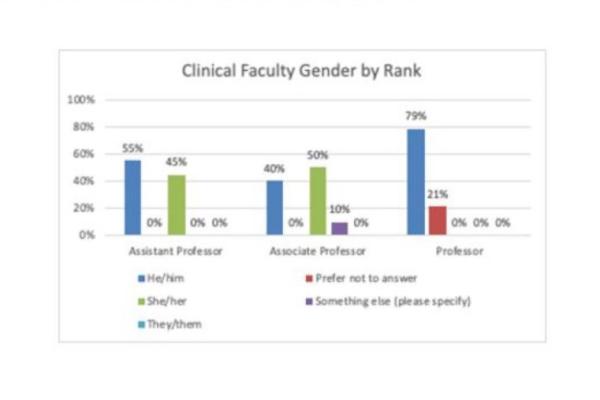
Hello, Neurology Family.
In previous monthly email updates, I promised to send out the finalized Neurology Department census data. I have attached a pdf of this data for everyone to review. As you hopefully know from my prior emails, transparency is one of the core tenets of inclusion, so we’re sharing the whole dataset. Thank you to everyone who responded. We had a response rate of >85% of the department. Please be aware, that most of the questions had an option not to respond, so if you don’t see any responses in a particular category where you believe the department does have representation, this could be due to the respondents choosing not to identify themselves along those lines.
I’m also attaching a PDF with the results of the D&I Committee’s work on accountability last year. You’ll see data on 5 self-assessments, one of which is the census. The others are analyses of our residency recruitment process, grand rounds speaker diversity, D&I efforts, and faculty pay equity.
This year’s theme is “equity,” so we will be working to rectify some of the inequities discovered during last year’s “accountability” projects.
I’d like to spend a moment addressing a topic we’ve covered in these emails in the past but is worth reviewing: microaggressions. Microaggressions are actions or words that indirectly or unintentionally discriminate or reveal bias against marginalized groups. Research has shown that the cumulative effect of microaggressions can be even more harmful than macroaggressions, which are more overt acts that unambiguously discriminate against or insult marginalized groups. Part of the harm caused my microaggressions is in their ambiguity. It takes cognitive effort to sort out if a microaggression was intentional or not. I’m not defending macroaggressions, but their obviousness can actually help people move on faster by being easier to process and categorize.
It is not my job as the departmental diversity officer to serve as the speech police, and I believe intent matters; we shouldn’t punish people for unintentionally committing a microaggression. But I do believe in education so people can make their own decisions about how they wish to behave. For example, making a joke about a patient’s name can have racial or ethnic implications and should be avoided. There are also cultural references that should likely be retired. I recently discovered that the famous Disney song Zip-a-Dee-Doo-Dah depicts Black people living in harmony with White people on a plantation in the 1800s in the southern U.S. Singing this in the hospital could easily be considered offensive despite it being a catchy tune that might cheer you up. It's really easy not to know this, so I try to bring these things up so we can make our own choices.
If you missed Dr. Jeffrey Baker’s talk, Forgotten Voices: Confronting Duke Hospital’s Racial Past, that was part of Internal Medicine Grand Rounds yesterday. One of the important messages he conveyed was that at the end of legal segregation, de facto segregation in health care occurred by sending the Black patients to resident clinics and the White patients to the attending clinics. Remnants of this can be seen in our department to this day. Until 2019, residents were assigned to see only patients with Medicaid or no insurance; due to the demographics of Durham, this led to a racial bias in assigning patients. I’m pleased to say that the racial and economic segregation for new patients coming into resident clinic has been resolved, and the residents now see patients with any or no insurance.
A reminder to everyone that the department operates an anonymous feedback box online. Please use this to make suggestions, recognize a colleague for outstanding work, or let us know about something you did that we should celebrate together as a department (don’t be humble or shy!)
I encourage you to review our Diversity and Inclusion website. It is undergoing upgrades and will soon have even more information about the departmental actions toward diversity, inclusion, and anti-racism in the coming weeks, so check back often.
